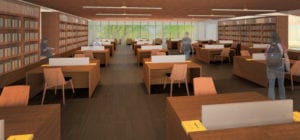
An artist rendering of the proposed Jewish Studies reading room at the Ekstrom Library (photo provided by the University of Louisville)
Three years ago, Professor Natalie Polzer was on the third floor of the University of Louisville’s Ekstrom Library when, out of curiosity, she decided to peek at the vacant room that used to be the campus writing center.
“The door was open; I wanted to see what the space was like,” she recalled. “The physical space is so beautiful. It overlooks the quad. You can see the greenery, the trees. It’s all window on one side – such natural light!”
She thought it would be a great space for a Jewish Studies reading room – understandably since Polzer, an associate professor of comparative humanities, teaches in the Jewish Studies program.
She floated the idea to an administrator who liked it. Unfortunately, the scandals surrounding UofL’s past president and the foundation were still swirling – a bad time for a new project.
That was then. Today, UofL and its foundation have new leadership. Now the idea for a Jewish Studies reading room is not only back on track, it’s being fast-tracked.
Artist renderings have been created for the future reading room, which is part of an estimated $2.5+ million third floor remodeling project. Construction begins in May.
Fundraising for The reading room, which has a more modest $500,000 price tag, is just getting started. Currently, the Jewish Studies program has no dedicated space at UofL.
“This will greatly increase the visibility of Jewish Studies on campus as well as the surrounding community,” said Professor Ranen Omer-Sherman, chair of the program.
The reading room will not be a classroom, though Polzer and Omer-Sherman say it will enhance Jewish instruction.
For instance, at a time when books are being transferred from the main floors of Ekstrom to a robotic retrieval area, Polzer envisions housing a “teaching library” – Talmud, Encyclopedia Judaica, etc. – in the reading room, giving students and instructors quick access to these texts.
“If they’re in robotic retrieval, you can’t [easily] show them,” she said.
A maze of one large room and several small anterooms, the space for the proposed reading room is currently being used for storage. It was left vacant when the writing center, a resource for students in need of help with papers, moved to the first floor.
Plans call for the space to be gutted, replaced by wood floor and ceiling (raised) as well as a retractable screen for films and presentations.
The reading room will be available for – excuse the pun – bookings for exhibits, seminars and, something near and dear to Omer-Sherman’s heart, the program’s annual colloquium series, when the faculty get to discuss their latest research projects.
And, like the rest of the revamped third floor, it will simply be a space where students can simply sit and study.
“Visually, it’s going to be a very, very stunning room on campus,” said Matthew Wyatt, UofL director of development, libraries. “The overlook – the floor-to-ceiling window out to the quad – is going to be amazing. I think it’s going to be a very popular destination.”
UofL plans to ask the Jewish Heritage Fund for Excellence for a $250,000 matching grant. The university will raise the rest. Wyatt hopes the balance can come from corporate contributions – a source the library hasn’t tapped in the past – and private donations from the Jewish community.
There are even naming opportunities: $500,000 will buy the naming rights to the entire room; $20,000, a bookcase; 2,500, a table; $1,500, chairs.
“You don’t want to do it like NASCAR,” Wyatt said, “but you want to do it tastefully, and we will.”
Omer-Sherman said the room will afford Jewish Studies the chance to accept donations of books and art from people who are moving or who recently passed away.
“This will be a good home,” he said.
It also will be a portal for non-Jews to learn about the community and its faith, he added.
“Non-Jews, including non-Jewish students who may have never met a Jew or taken a class in Jewish Studies, will become aware of our part of the multi-cultural fabric on campus and the multicultural fabric of Louisville, too.”
Wyatt said the reading room is consistent with the library’s mission to serve all ethnic groups and communities represented on campus.
For Polzer, though, it will simply be the realization of a three-year-old dream.
“I was just enchanted by the light and the space,” she recalled. “Had this been a basement room, I doubt the idea would have come to me.”



